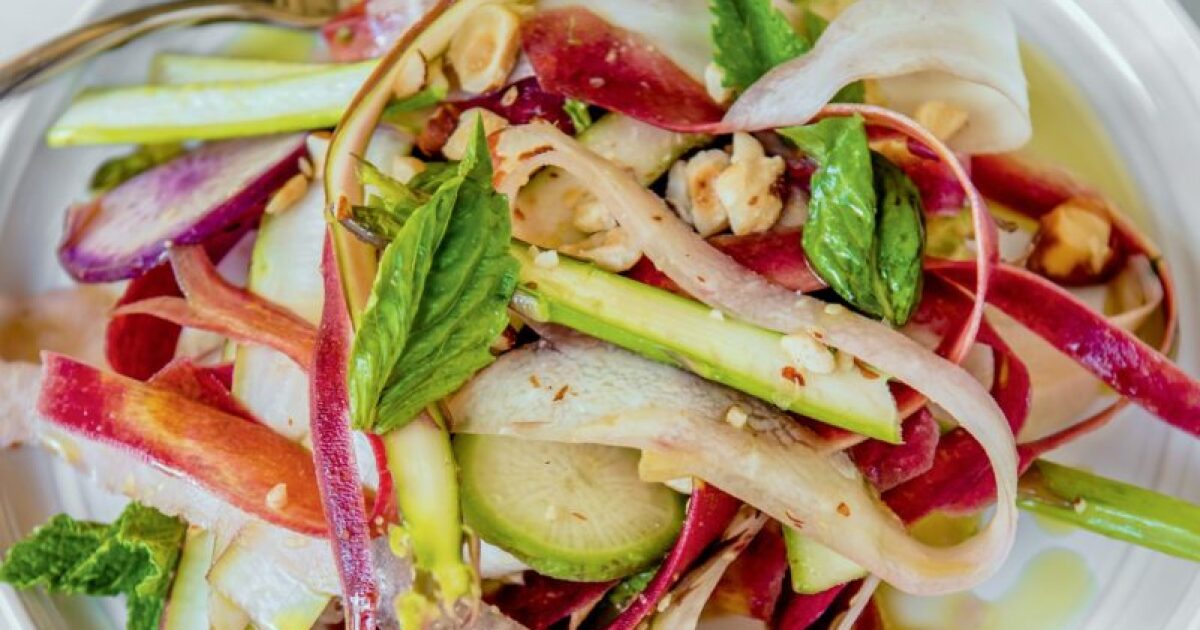Part of the Food Policy Snapshot Series
Policy name: Organic Meals at West Contra Costa Unified School District
Overview: West Contra Costa Unified School District (WCCUSD) has partnered with Conscious Kitchen to incorporate mostly organic, whole foods into school meals prepared from scratch.
Location: West Contra Costa Unified School District, California
Population: 54 schools, 28,246 total students
Food policy category: Nutrition, food access
Program goals: To overcome health problems among low-income children by increasing access to nutritious, organic, whole foods.
How it works: The school district has partnered with Conscious Kitchen, a local nonprofit focused on feeding healthy, organic, affordable, and delicious breakfast and lunch using as many organic ingredients as possible to children in low-income school districts. For the 2021-2022 school year, breakfast includes a main course, fruit, and milk, with food costs averaging $1.56 per meal. Lunch includes a main course, a vegetable side, and milk or water, and food costs an average of $2.35.
Conscious Kitchen works with local schools and school districts, local farmers, ranchers, and purveyors such as Nana Mae’s Organics, Tomatero Farm, Mindful Meats, Full Belly Farm, Earl’s Organic, and Lundberg Family Farms as well as about 40 other vendors to provide the organic ingredients.
Progress to date: During the 2018-2019 school year, Conscious Kitchen began a pilot program working with WCCUSD to provide scratch-cooked organic meals to one school in the district. The goal of this pilot was to study food and labor costs and other unanticipated expenses or challenges and, ultimately, to determine if this concept would work district-wide.
Due to budget and labor constraints, the district was unable to continue the program for the 2019-2020 school year. When COVID hit and schools closed in 2020, WCCUSD was able to provide families with single-serve prepared meals they could take home during the spring and summer. In the fall, the district was able to start including more fresh, local, organic, whole food items, and by winter, they were sending home boxes that contained meal components for three meals and one snack per day for seven days (28 meals in total). The boxes included organic fruits, vegetables, dairy, grains, and protein, as well as sample recipes and educational information. As the boxes were rolled out to replace the prepackaged meals, interest in the program increased, and 21,000 boxes were served each week. By March of 2021, all ingredients and foods included in the boxes were USDA certified organic.
Now, in the 2021-2022 school year, WCCUSD is working to continue providing healthy, organic foods in the meals consumed by children in the schools.
Why it is important: Approximately 66 percent of WCCUSD’s students live in low-income households, and more than two-thirds receive free or reduced-price meals. Meals provided at or through the school are often the students’ main source of nutrition, as parents may not be able to afford or provide enough healthy foods at home.
Children who are hungry are more likely to be hyperactive, aggressive, and distracted in school. Physically, hunger and food insecurity are linked to type 2 diabetes, high blood pressure, heart disease, and obesity in adults, and overall poor health in children.
WCCUSD, with the support of Conscious Kitchen, is providing healthy food to children in need while also supporting local organic farmers and vendors, many of whom were struggling to survive during the height of COVID.
Program/Policy initiated: The program was first piloted at one WCCUSD school during the 2018-2019 school year.
Point of contact:
Barbara Jellison, Food Service Director, WCCUSD
Email: bjellison@wccusd.net
Judi Shils, Executive Director, Conscious Kitchen
Email: judi@turninggreen.org
Similar practices: Conscious Kitchen also works with Sausalito Marin City School District in Marin County, California.
Evaluation: Evaluation of this school year’s meals has not yet been conducted. The food boxes paid $17 million to local farmers and vendors to purchase 10.7 million pounds of organic food, which provided 18.7 million meals for students and their families between November 2020 and August 2021. In January 2021, a surveys of families served found that 45 percent liked all items in the boxes, and 50 percent liked most of the items.
Learn more:
References:
Write for The New York City Food Policy Center is always on the look out for innovative, intelligent writers who can produce high-quality, research-based content. Read more here: https://nycfoodpolicy.org/write-nyc-food-policy-center/
Copyright © 2021 Hunter College New York City Food Policy Center. All Rights Reserved.



